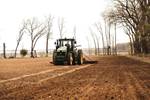Heartland completes first industrial hemp fiber life cycle assessment
Life cycle assessment (LCA) studies Heartland’s Imperium Filler natural fiber additive as a carbon-negative replacement for mineral fillers commonly used in plastics.
One of Heartland's industrial hemp fiber fields. Photo Credit: Heartland
(Detroit, Mich., U.S.), a biotech company that engineers hemp fibers as additives for plastics, has completed its life cycle assessment (LCA) to determine the carbon footprint of — a lignocellulosic powder/natural fiber additive — from cradle to gate. This research shows that every 1 kilogram of Imperium Filler removes 3 kilograms of CO2 equivalent (CO2e).
Heartland’s LCA was completed by (San Francisco, Calif., U.S.) and Steffan Unnasch, managing director of (Portola Valley, Calif., U.S.), in accordance with ISO 14040 Standards for LCAs.
The research studied Heartland’s Imperium Filler as a replacement for mineral fillers commonly used in plastics. Specifically, the LCA quantifies filling plastic with 20% Imperium Filler to replace talc and calcium carbonate (two commonly used plastic additives).
In addition Heartland’s Imperium Filler is also used as an additive for rubber, foam, asphalt, paper and concrete. This LCA will provide the backbone for lower carbon footprint solutions across raw material supply chains, according to the company, decarbonizing plastic products without compromising strength or cost.
“SEC climate disclosures are coming online over the next couple of years. This is going to force public companies and their suppliers to disclose scope 1, 2 and 3 carbon emissions,” Heartland CEO, Jesse Henry, says. “Our sustainability platform will support manufacturers with the materials and technologies needed to create lower carbon footprint everyday products.”
Heartland’s carbon-negative additives are reported to be simple, drop-in solutions that reduce the environmental impact of products. See “Augmenting engineered thermoplastics with natural fibers” to learn more.
Related Content
-
Infinite Composites: Type V tanks for space, hydrogen, automotive and more
After a decade of proving its linerless, weight-saving composite tanks with NASA and more than 30 aerospace companies, this CryoSphere pioneer is scaling for growth in commercial space and sustainable transportation on Earth.
-
Plant tour: Airbus, Illescas, Spain
Airbus’ Illescas facility, featuring highly automated composites processes for the A350 lower wing cover and one-piece Section 19 fuselage barrels, works toward production ramp-ups and next-generation aircraft.
-
Welding is not bonding
Discussion of the issues in our understanding of thermoplastic composite welded structures and certification of the latest materials and welding technologies for future airframes.






